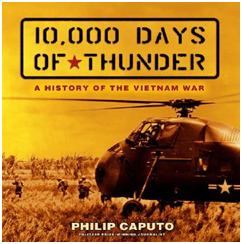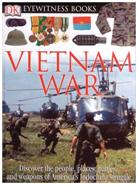 It has been 33 years since the end of the Vietnam War – and yet it remains a terribly difficult story to tell, and there are very few books which can be used to explain to young people what happened.
It has been 33 years since the end of the Vietnam War – and yet it remains a terribly difficult story to tell, and there are very few books which can be used to explain to young people what happened.
World War Two suffered no such lack of attention or resources. By 1978, there were any number of useful books, biographies, and movies which helped to educate the boomers about what their parents had gone through.
The differences and difficulties are obvious, of course. The United States lost the Vietnam War. The memories are painful. Attitudes towards the war have continued to divide the boomer generation and its successors. In many ways, Barack Obama will be the first truly post-Vietnam president.
Nonetheless, telling the story of the Vietnam War to our children is an important task. Yes, it is difficult, but it remains important.
 Up until Philip Caputo’s book, the best book for middle & high school students I knew of was Albert Marrin’s America and Vietnam: the Elephant and the Tiger. Marrin is an excellent historian, and an excellent writer. He’s the retired head of the History Department at Yeshiva University in New York. His book remains the best high school reading-level text currently available.
Up until Philip Caputo’s book, the best book for middle & high school students I knew of was Albert Marrin’s America and Vietnam: the Elephant and the Tiger. Marrin is an excellent historian, and an excellent writer. He’s the retired head of the History Department at Yeshiva University in New York. His book remains the best high school reading-level text currently available.
But along with Marrin’s book I would now also highly recommend Philip Caputo’s 10,000 Days of Thunder. It is written for a slightly younger audience and is much more visual and episodic in its approach to telling the story. It contains 40+ double-page spreads, each devoted to covering an aspect of the war, almost always with a full-page photograph and an excellent short essay on the topic at hand.
Here’s a sample of the topics:
- Communism
- Origins of the Vietnam War, Part One: French Colonialism in Vietnam
- Origins of the Vietnam War, Part Two: The Dividing of Vietnam
- Origins of the Vietnam War, Part Three: The Reasons for American Intervention
- Viet Cong
- The Tonkin Gulf Incidents
- The Ia Drang Campaign
- The Ho Chi Minh Trail
- Agent Orange
- The Tet Offensive
- Atrocities: Hue and My Lai
- The Antiwar Movement
- The Draft
- Vietnamization
- The Paris Peace Talks
- The Fall of Saigon
- The Vietnam Veterans Memorial: The Wall
Caputo is a Pulitzer Prize winning author, and a Vietnam vet himself. His memoir of his experiences in Vietnam as a marine Lieutenant, A Rumor of War, has sold over two million copies since its publication in 1977. His prose style is clear and even-handed, not polemical. It is in his descriptions of the experience of individuals on the ground that he excels. The most gripping parts of this book, both visually and textually, are the units on how the war affected individuals. These make the book unique. Here’s a sample of the topics:
- The Advisors’ War
- The Riverine War
- The Unconventional War
- The Company Commanders’ War
- The Villagers’ War
- The Corpsmen’s War
- The Nurses’ War
- The Tunnel War
- The Journalists’ War
- Prisoners of War
With its heavy visual emphasis, this is a book that will be accessible and capture the interest of students from grades 5 and up. Even high school students and adults will find it an evocative introduction to a painful period of American history. It does not cover any of these topics in depth, but what it tells is true and thought provoking.
10,000 Days of Thunder is a hardback, 128 pages with color photography throughout. It can be purchased for $23.99 directly from Greenleaf Press.
 There is also an excellent book available from DK in their Eyewitness Series, titled simple Vietnam War (hardback, $15.99). If you’d like to study this important time period with your students, I’d recommend all three books as resources: Marrin, Caputo, and DK.
There is also an excellent book available from DK in their Eyewitness Series, titled simple Vietnam War (hardback, $15.99). If you’d like to study this important time period with your students, I’d recommend all three books as resources: Marrin, Caputo, and DK.
– Rob Shearer, Publisher
Sounds like a great historical account of the Vietnam conflict. Also, from your explanation the book seems complete in its telling of the origins of the conflict. Colonialism dude… its been a problem. Bringing westernization without modernization…bad stuff.
Colonialism is such a broad category as to be meaningless. After all, we started out as colonists! Britain seems to have been relatively benevolent, though not universally so. The French have a much worse record – with Vietnam being a particularly bad spot. Ho Chi Minh is famously quoted as saying if Ghandi had attempted civil disobedience in French Indo-China rather than British Indian, he’d have ascended into heaven in a matter of seconds. The french did not bring westernization, modernization, or industrialization to Vietnam, rather they exported the worst of their medieval, feudal practices, including the corvee and the gabelle.
Colonialism is not inherently evil… but human nature is!
Good stuff… but colonialism is still bad. Colonialism by western powers such as Spain, France, and Great Britain was a by product of a mercantilist economic system. A mercantilist system that focused on making the rich more wealthy and the poor more impoverished. Sure there were other colonizations before these powers… but these western powers were the ones that corrupted any goodness that colonialism had with a single greedy blow.
Actually, I would contend that the “New Colonialism” of the 19th century was not economically motivated. It was a function of prestige, pride arrogance, and an irrational desire to color in large parts of the global map in the color of your nationality – think of the bureaucrats as playing a game of Risk, with real countries.
It had much to do with flags and fancy uniforms (yes, I AM thinking of Eddie Izzard!).
It really made no sense economically. The colonies cost much more to maintain than any supposed “profit” or trade they produced.